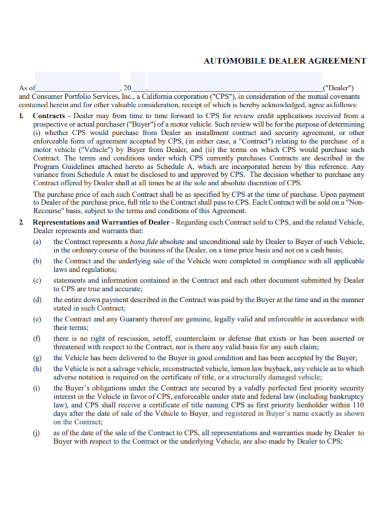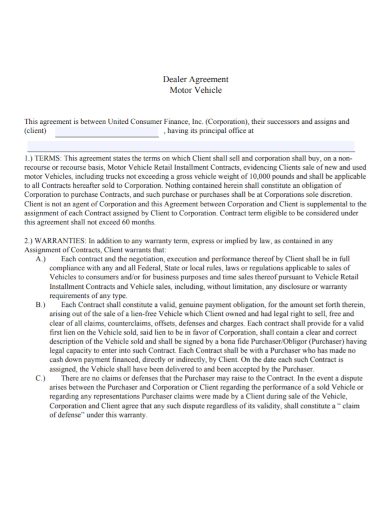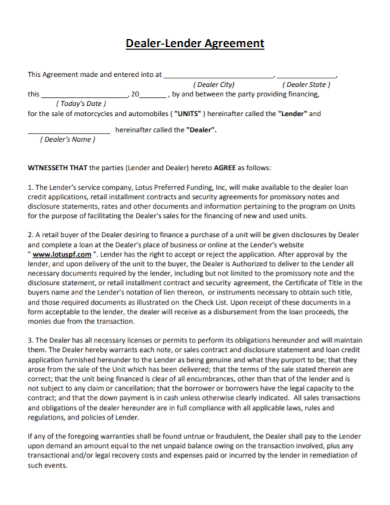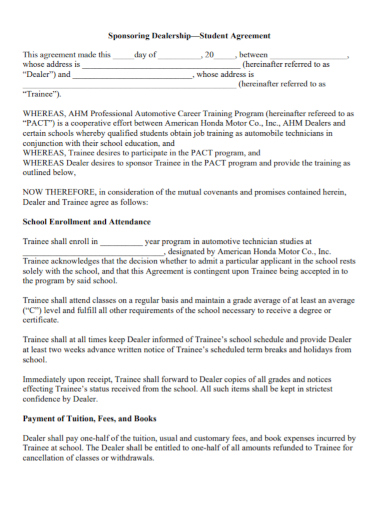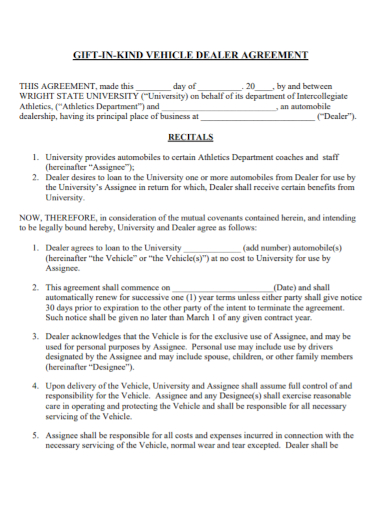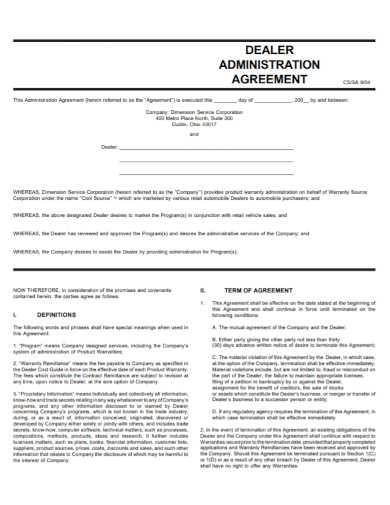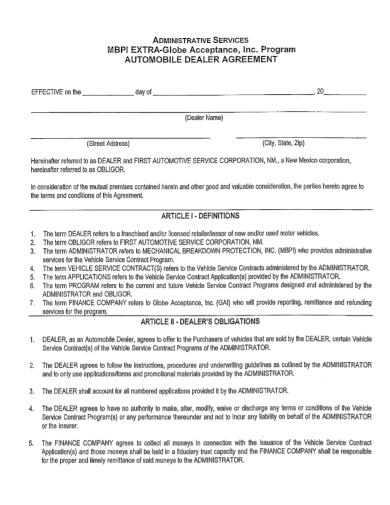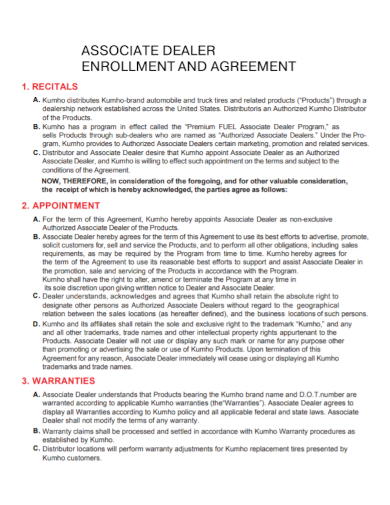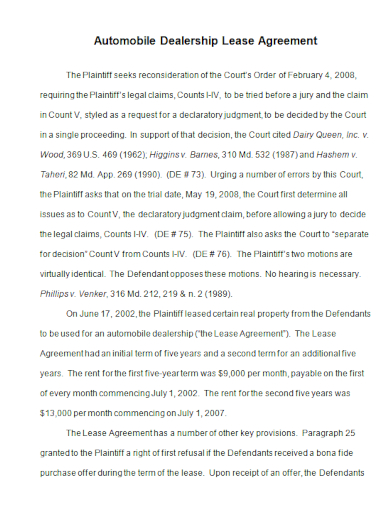Opening a vehicle dealership necessitates meticulous preparation. Aspiring dealers must consider the individual legal requirements that must be met in their state in order to operate a dealership. Other factors to consider are your local market, whether to sell new or used automobiles, what initial costs you’ll face, and how to establish a sound business plan. If you want your business to take off and last a long time, you’ll need to account for all of these factors and more.
8+ Automobile Dealership Agreement Samples
Almost every auto enthusiast dreams of one day having a large garage filled with their favorite vehicles. Whether you collect iconic muscle cars, vintage roadsters, or classics from a single manufacturer, you may share the desire of amassing a large collection of your favorites. While many people aspire to collect automobiles, not everyone considers them to be collectible assets. Entrepreneurs across the country, on the other hand, regard them as marketable items that can be sold to make money. Auto dealers come in various kinds and sizes, from modest mom-and-pop shops to individuals who sell a few cars in private transactions each year to large corporations with over 100 sites.
1. Automobile Dealership Agreement
2. Automobile Motor Vehicle Dealership Agreement
3. Automobile Dealership Lender Agreement
4. Automobile Sponsoring Dealership Agreement
5. Automobile Vehicle Dealership Agreement
6. Automobile Dealership Administration Agreement
7. Automobile Dealership Acceptance Agreement
8. Automobile Associate Dealer Enrollment Agreement
9. Automobile Dealership Lease Agreement
Things to Consider When Opening a Car Dealership
- Dealership location – The quantity of sales and profit you make in a specific year are influenced by the location of your dealership. Some states are more profitable than others and have a superior business climate. What factors contribute to a state’s suitability as a location for a dealership? Average annual sales, the costs of launching the dealership, as well as regular payroll expenditures and weekly employee compensation in your location, are all things to think about.
- Type of dealership – Do you have a specific type of dealership in mind? Will you be launching a brand-new (or franchised) car dealership, or will you focus on used cars—or both? You might even specialize in electric vehicles, premium vehicles, or vehicles from other countries. This has to do with where your firm is located and who your target audience is. The crucial thing to remember is that your decision will define the direction of your company. Opening a new vehicle dealership, for example, will necessitate more finance, whereas a used vehicle dealership will necessitate less financing but will likely return lower earnings.
- Business and financial plan – Two more critical elements of the dealership puzzle are your corporate and financial plans. Finally, the decisions you make about where and what kind of dealership you want to open will influence these two. Based on that, you begin to make ideas for how you will run the company from A to Z, as well as how you will fund it. There are various types of business plans, so consider why you need one—to obtain a bank loan, to attract outside investment, or to serve as an internal strategic plan to steer your company’s growth. Any money you spend on building a business is money well spent, since it will likely save you a lot more money in the long run by lowering the number of tries and errors you make due to a lack of strategy or experience. The same may be said for your financial strategy. Furthermore, if you intend to seek investors or ask for a loan to get your dealership up and running, you must have a business plan.
- Licensing requirements – In order to operate a dealership in any state, you must first obtain a business license that allows you to sell specific types of vehicles. The prerequisites for obtaining a license differ greatly from state to state. Some states have few requirements and costs, while others have stringent, time-consuming, and even costly licensing procedures.
- Legal provisions and requirements – When you start selling cars, you’ll have to follow a number of state and federal regulations. The necessity to get a surety bond is one of the particular requirements included in most states’ dealer licensing regulations. Dealer bonds are financial assurance agreements that ensure dealers will follow state rules governing the selling of automobiles. They provide consumer and state government protection by providing compensation in circumstances where dealers break the law and cause losses or damages to any of these parties.
FAQs
What are the considerations you must know when it comes to dealerships?
To begin, you should have some prior experience in the automotive business. The automobile industry has its own beat, terminology, and business etiquette. From the outside, it’s impossible to comprehend them. Car repair experience, sales experience, customer service experience, and car lot management or finance expertise are all appropriate backgrounds in this business. Second, to get into this profession, you’ll need a lot of cash and excellent credit. A tiny used car dealership may have a little, out-of-the-way lot and a few automobiles costing around $50,000, but a new car dealership will cost millions. The value of your personal belongings will be truly tested. The day-to-day costs of operating a dealership will always be significantly higher than you anticipate.
What are the business registrations that your car dealership can have?
You can register your business as one of the following depending on the state in which you plan to open a car dealership:
A sole proprietorship is a business that is owned and operated by one person.
General Partnership
Limited Partnership
Limited Liability Company (LLC)
Corporation
This article is only a high-level overview of how to start a car dealership, but it should give you a fair idea of where to begin. Before you invest any money on more extensive work, you should consult with dealers, bankers, accountants, marketing firms, and business attorneys.
Related Posts
FREE 10+ Trial Agreement Samples In MS Word | Google Docs | Apple Pages | PDF
FREE 9+ Shop Rental Agreement Samples [ Commercial, Lease, Tenancy ]
FREE 10+ Charter Agreement Samples In MS Word | Google Docs | Apple Pages | PDF
FREE 10+ Mentoring Agreement Samples In MS Word | Apple Pages | PDF
FREE 10+ Partner Agreement Samples In MS Word | Google Docs | Apple Pages | PDF
FREE 10+ Individual Agreement Samples In MS Word | Google Docs | Apple Pages | PDF
FREE 10+ Strategic Agreement Samples In MS Word | Google Docs | Apple Pages | PDF
FREE 10+ Equity Agreement Samples In MS Word | Google Docs | Apple Pages | PDF
FREE 10+ Producer Agreement Samples in MS Word | Apple Pages | PDF
FREE 10+ Grant Agreement Samples In MS Word | Apple Pages | PDF
FREE 8+ Meeting Agreement Samples in MS Word | Google Docs | Apple Pages | PDF
FREE 10+ Community Agreement Samples In MS Word | Google Docs | PDF
FREE 8+ Real Estate Option Agreement Samples in MS Word | PDF
FREE 10+ Call Option Agreement Samples In MS Word | PDF
FREE 10+ Advertising Agreement Samples In MS Word | Google Docs | Apple Pages | PDF

